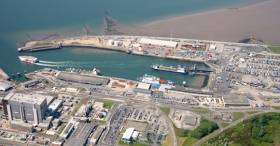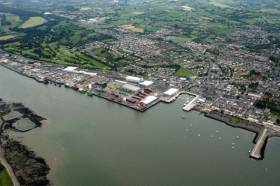Displaying items by tag: Brexit Ports
UK Ports Group Confirms Details of Government Brexit Funding
The Irish Sea ports of Liverpool and Heysham in addition Sheerness (London Medway) all part of the Peel Ports Group, have received funding to enhance measures they have already taken to improve resilience ahead of the UK’s expected departure from the EU on 31 October.
The funding according to Peel Ports Group was announced last month by Transport Secretary Grant Shapps.
These funds will go towards creating more space for HGV parking and container storage to support smooth trade operations by RORO (roll-on, roll-off) ferries, especially across the Irish Sea. (Afloat adds, Peel Ports also operate the MTL Terminal in Dublin Port.)
The fund comes as part of a £30m government scheme, announced last month, to bolster ports across England and ensure they continue to operate efficiently post-Brexit.
Mark Whitworth, Chief Executive Officer of Peel Ports, said: “We are doing everything we can to help our customers continue delivering import and export trade throughout our port network. This government funding helps us to put in place additional measures to achieve that. Whatever happens after 31 October we are as ready as we can be to facilitate global commerce that will benefit the UK economy.”
Transport Secretary Grant Shapps said: “Our world-leading maritime ports are fundamental not only to our success as a global trading nation but also to people’s everyday lives, bringing vital goods into the country. This timely investment will support ports across the country in their work to boost capacity and efficiency, ensuring they’re ready for Brexit and a successful future.”
For information on Peel Ports RoRo services click this link.
Brexit Ports: British Ports Association Call for Special Zones
#BrexitPorts - The British Ports Association (BPA) in response to potential administrative complications that could arise from Brexit, is calling for the UK government to classify port areas and surrounding clusters as ‘special port zones’.
As Container Management writes, BPA chairman Rodney Lunn and director Richard Ballantyne met with John Hayes, the minister of state at the Department of Transport to address concerns that Brexit could bring increased frontier and customs activities at ports.
There are concerns that these added processes could discuss cargo and logistics flows, making UK ports less competitive and adding costs to the freight industry, noted a statement from the BPA.
To tackle these issues, Ballantyne stated: “We envisage a system whereby port areas and surrounding clusters might be classified as ‘special port zones’ with fast tracked planning and licensing systems.
“Such zones could safeguard against restrictive environmental designations, which can often limit port growth and development,” he added.
Ballantyne also highlighted his wish that government activity at UK borders do not disrupt freight and passenger gateways.
In any case, the specific conditions of Britain’s post-Brexit trading relationship with the European Union (EU) will only become known following the UK government’s triggering of Article 50 of the Lisbon Treaty and a subsequent negotiation.

























































